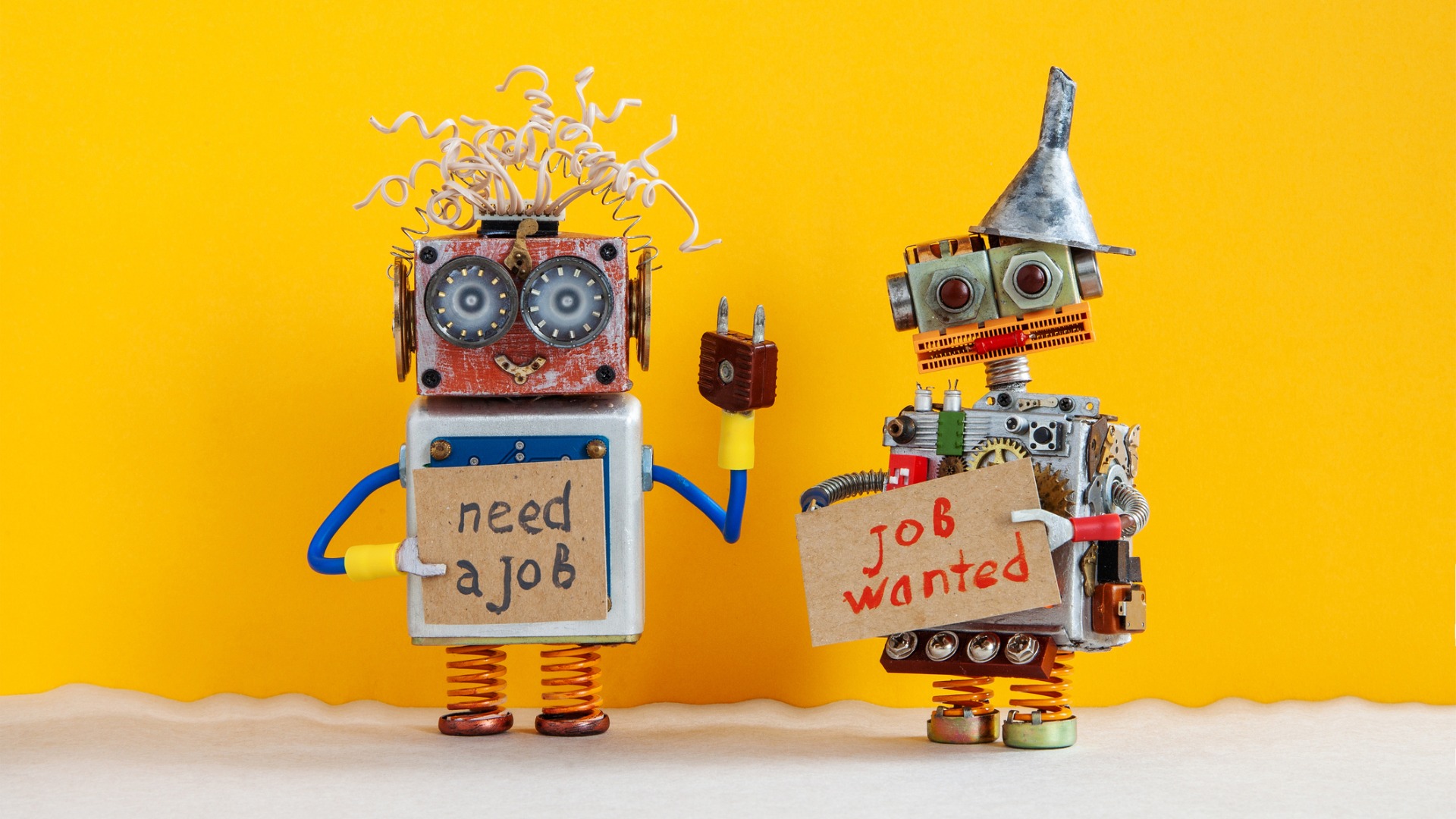Artificial intelligence and machine learning have allowed businesses to automate numerous processes, crunch large volumes of big data and find actionable insights better than humans. This, understandably, can make employees nervous.
In this blog post, we explore the effects artificial intelligence and machine learning can have on employment, emerging employee roles and what the future may hold.
Download our AI Economy & Job Outlook Report to see how much AI will impact the future.
The case for more automation
In previous blog posts, we discussed big data and the effects it’s having on many industries. As businesses deal with more variety and ever-increasing volumes of unstructured data, internal processes and the roles that manage them are rapidly changing. User-generated content contains valuable insight, but employing more humans to filter and process such content simply isn’t efficient.
Businesses are naturally looking toward automated solutions, powered by artificial intelligence and machine learning to process data sets and monetize them.
Consider the role of the social media manager, a role like this may include the following responsibilities:
- Planning and goal setting
- Development of brand awareness and online reputation
- Content management
- SEO (search engine optimization) and generation of inbound traffic
- Cultivation of leads and sales

These tasks can all be performed manually, but the time and effort involved in developing brand awareness and monitoring online reputation, for example, is almost a full-time job.
What about curating, scheduling and distributing content? Generating sales leads?
The answer to these sorts of questions isn’t simply more hours or more people. Over the past few years, we’ve seen the creation of products and services that augment existing employees’ skill sets to help get a handle on the sheer volume of data and manage it.
Professions at risk
Life Insurance
Selling insurance normally involves an in-depth assessment of the prospective customer by an experienced underwriter which uses an established set of models. Lapetus, a science and technology startup, is using AI to change this process.
Their customizable risk assessment tools are grounded in algorithms using machine learning techniques that continually improve and provide more data.
Armed with this data, the software can make predictions regarding a customer’s potential life expectancy. All of this takes just a few minutes; no need for the traveling salesman or anymore.
Freight
In 2016, San Francisco startup Otto (owned by Uber) successfully delivered 50,000 cans of Budweiser. All of this was powered by artificial intelligence.
From a commercial perspective, integrating AI into long-haul trucking routes yields costs savings and has the potential to save lives – AI routines don’t suffer from fatigue.
Gartner predicts that by 2020, there will be approximately 250 million cars connected to each other via WiFi. This will be to allow them to communicate with each other on the roads.
Lawyers and Paralegals
During the discovery phase of legal cases, lawyers and paralegals often must go through thousands of documents. Now, thanks to machine learning and techniques such as natural language processing (NLP), thousands of documents can be processed in minutes. The most frequently-used topics and keywords rise to the surface, thereby allowing them to identify important issues in a fraction of the time, and staying focused on the right topics.
Download our AI Economy & Job Outlook Report to see how much AI will impact the future.
Jobs that will be created
It’s easy to be unnerved at the rapid rate of innovation, but new technology requires new skill sets, and new types of employment will be created.
[bctt tweet=”New technology requires new skill sets, and new types of employment will be created. #AI” username=”GAPapps”]
AI and ML will certainly reduce human involvement in specific types of roles, that said, there are still tasks that machines simply cannot replicate. The machine has no concept of empathy or understanding, consequently, AI routines and algorithms will still need humans to “train them.”
Consider chatbots: Chatbots are increasingly being used to handle customer service queries and complaints. They can do this by interpreting human language, and advancements in text analytics allow the machine to determine key phrases and emotions in conversations.
Before any of this can happen, however, chatbots must be trained.
Kemoco Inc. is a company that provides emotional support as a service for chatbots and voice assistants such as Alexa and Siri.
Kemoco’s algorithms allow voice assistants to respond to humans with sympathy and more understanding of what, in most cases, is generally a set of canned responses.
Empathy
Services such as Kemoco must be provided with training data that contains the emotion they are to identify. Additionally, if the service returns an incorrect response, the machine learning engine must be further trained to identify incorrect responses. A human touch is necessary to the success of the technology.
AI and Data Consultants
Technologists sometimes have difficulty communicating tech-speak to business leaders in plain English. AI Consultants will help provide clarity on the inner workings of algorithms to ensure business leaders fully understand how their AI solutions arrive at outcomes.
Consider the General Data Protection Regulation (GDPR) legislation that is coming into force in May 2018. The legislation leans heavily on protecting the personal data of an individual, and firms operating in the EU will need to be careful in terms of how to collect and process customer data.
AI Consultants will be needed to reassure businesses and developers their solutions don’t violate legislation like GDPR. Otherwise, if a company’s use of data analytics and automation technologies ends up discriminating against certain groups of people, they can face fines that can cost them up to 4% of their overall revenue!
Amazon Mechanical Turk
Possibly an early sign of things to come are services such as Amazon’s “Mechanical Turk”. Using AMT, businesses can split labor-intensive tasks into the smallest units of work, which can then be delivered online.
Quite often, these tasks cannot be performed by a machine; it may involve for example labeling each row of a CSV file into positive, negative or neutral sentiment. This data could then be used to train an AI algorithm.
The Future
It’s natural to worry that services such as Amazon’s Mechanical Turk will create a “race to the bottom” regarding price, thereby creating a community of freelancers working for pennies.
It’s hard to predict exactly how this will play out in the future and governments will need to research and examine the consequences of innovations in artificial intelligence and its effect on employment levels.
These concerns are actively at the forefront of today’s leading technology innovators. Entrepreneur Elon Musk has brought the concept of a Universal Basic Income (UBI) back into mainstream and Kenya is currently testing UBI and Switzerland is considering it. (Futurism.com) Other industry leaders are focused on the jobs that will be created as a result of automation. Autodesk chief Andrew Anagnost recently shared on Fortune, saying future jobs “would be in building, programming, deploying, and maintaining automated systems.”
Summary
In this blog post, we’ve discussed artificial intelligence, machine learning, and the effects that it might have on employment – both positive and negative. We’ve also looked to the future and explored what that may entail.
Here at Growth Acceleration Partners, we have extensive expertise in many verticals. Our Centers of Engineering Excellence (COEs) in Latin America focus on combining business acumen with top-notch expertise to help your business.
We can provide your organization with resources in the following areas:
- data analytics
- data science
- information systems
- machine learning
- predictive modeling
- software development
If you’d like to find out more, then visit our website here. Or if you’d prefer, why not arrange a call with us or send us an email?



Comments are closed.